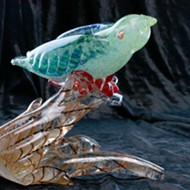[{
"name": "Ad - Medium Rectangle CC01 - 300x250",
"id": "AdMediumRectangleCC01300x250",
"class": "inlineCenter",
"insertPoint": "8",
"component": "2963441",
"requiredCountToDisplay": "12"
},{
"name": "Ad - Medium Rectangle LC01 - 300x250",
"id": "AdMediumRectangleCC01300x250",
"class": "inlineCenter",
"insertPoint": "18",
"component": "2963441",
"requiredCountToDisplay": "22"
},{
"name": "Ad - Medium Rectangle LC09 - 300x250",
"id": "AdMediumRectangleLC09300x250",
"class": "inlineCenter",
"insertPoint": "28",
"component": "3252660",
"requiredCountToDisplay": "32"
}]
The basic outline for the plot to William Shakespeare’s Macbeth can be explained in a children’s book. If you give the Thane of Glamis (Macbeth, the title character) the title Thane of Cawdor, he’s going to want to be king. And if he manages to become king, through foul and treacherous murder, he will be discontent, wanting to be “safely thus.” Then, of course, he’ll want a glass of milk to wash it all down and help him sleep off the memory of his crimes. This is where all resemblance between play and children’s book ends.
The Scottish Play, as the theatrical community calls it, is as malevolent and bloody as any Tarantino film. It boasts a female character whose spine seems to be reinforced with steel, making Macbeth one of Shakespeare’s most memorable plays. PCPA is staging the production, set in sparse 10th century Scotland, through March 7.
The location is effectively established with minimal set elements, the centerpiece, figuratively and almost literally, being a large gladiatorial pit onstage. The circle doesn’t seem to serve much purpose, beyond acting as a kind of spotlight that places emphasis on certain events and exchanges. When two characters approach one another within the ring, the suggestion of battle and survival are inherent. A stone outcropping, topped by a large tree, serves as the only other major set element.
The only concessions made to domesticity or civilization are a chair and bassinet that appear only briefly; the collapse between wild and cruel nature and gentle and orderly civilization is immediately apparent. Even the scenes which we know to take place inside a castle appear to be outside, among the rocks and trees. It’s a set smartly done, designed to play with the mind of its audience.
Everybody’s favorite wyrd sisters—traditionally interpreted as witches, though Shakespeare never actually calls them that—receive an unexpected makeover. Wearing bodysuits trimmed with flora-like strings of fabric, the trio creeps and staggers and stalks, hisses and croaks, more like amoebas evolving painfully into higher life forms than cackling witches. They dip into backbends, and seem to lurk at the periphery of every scene.
Another standout was Mark Booher who seemed to fall into the role of Banquo very naturally. He stands as a reasonable and solid presence whose death truly marks the play’s downward violent spiral.
As for the hand that spilled Banquo’s blood, Corey Jones is a respectable Macbeth leaping from innocence to plotting to madness and guilt more quickly than a reading of the text of the play can reveal. The wyrd sisters might be responsible for planting the initial seed, but it is startling how quickly it takes root. Too often when performing Shakespeare, actors tend to perform the role with a degree of pomp that reinforces, for the audience, the fact that they are watching a play. The character—whether a king or fairy—never becomes an actual person. Jones’ Macbeth retained a shade of this exaggeration. When he speaks, the impression is that he speaks for the audience. This style was well suited to the character’s ravings as the play progresses. When he snatches at daggers that do not exist and bemoans the fact that he cannot pronounce amen, the shadow of melodrama meets well the impression of madness. But it makes it difficult to regard Macbeth as a living and breathing human.
Happily the tale is not, as Macbeth suggests, told by an idiot. Nor does it signify nothing. There are a few moments when you just have to delve beyond the theatrics to get there.
Arts Editor Ashley Schwellenbach croaks the fatal entrance of Duncan. Shoot daggers at [email protected].










